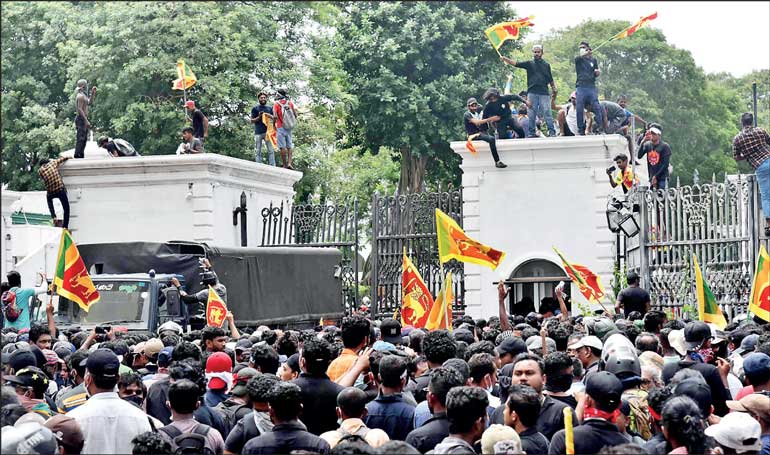Tuesday Feb 17, 2026
Tuesday Feb 17, 2026
Saturday, 16 July 2022 00:20 - - {{hitsCtrl.values.hits}}

If Aragalaya youth become political players of their own and contest the next election, or continue to be agitators, both are positive developments - Pic by Ruwan Walpola
 Recently we heard that a meeting is planned between the leaders of political parties, the Parliament and the Aragalaya, and invitations have been sent to 20 persons from the Aragalaya. Mercifully, the meeting was cancelled within a few hours. How did the speaker come up with the 20 names and how fair was the selection? These were the questions on everybody’s mind. Given the amorphous nature of the Aragalaya, the move would have resulted in much unhappiness and discord.
Recently we heard that a meeting is planned between the leaders of political parties, the Parliament and the Aragalaya, and invitations have been sent to 20 persons from the Aragalaya. Mercifully, the meeting was cancelled within a few hours. How did the speaker come up with the 20 names and how fair was the selection? These were the questions on everybody’s mind. Given the amorphous nature of the Aragalaya, the move would have resulted in much unhappiness and discord.
Those who were at forefront of the struggle to remove the Rajapaksas naturally expect to play a role in a post-Rajapaksa interim government. The Frontline Socialist Party (FSP or Peratugamis) and Inter University Students’ Federation (IUSF) have been the most visible in the key confrontations of 9 May leading to the resignation of Mahinda Rajapaksa from the premiership, and on 9 July leading to the fleeing of Gotabaya Rajapaksa from Presidency, and all other confrontations in between. The prowess of FSP and IUSF on organised protests was clearly the reason for the success of these efforts. But it will be a mistake to equate the Aragalaya with those who led the confrontations. The diverse and large group of individuals, young and older, who were right behind in the confrontations and sustained the Aragalaya for 90 plus days in various ways must be reckoned.
Ad hoc engagements would be undemocratic
If one or more specific groups from the Aragalaya or any other constituency are invited to be part of the, say, all party deliberations in the Parliament, you don’t need to be a constitutional expert to know it is not correct. The sovereignty of the republic of Sri Lanka is vested in you and me, the people. Whether we like them or not, our 225 parliamentarians have got there through steps outlined in the Constitution, to exercise our legislative powers on our behalf. There cannot be others.
Though there is increasing dissatisfaction with representative democracy, none of the alternatives envision replacing the representative democracy or adding other appendages. According to the 2022 Inter Parliamentary Union’s report on “Public engagement in the work of parliament” parallel systems of People Assemblies (Many countries) and initiation of legislation through signed-in petitions (e.g. South Korea) are the two examples cited by IPU as modes of public engagement.
Democratic modes of engagement
How are these democratic modes of engagement between citizen groups and the Parliament operationalised and how can those be applied to the Aragalaya youth?
nElection from a recognised constituency: Of the 225 members of the youth parliament of Sri Lanka, 165 are chosen by elections from youth clubs across the 14,000+ GNDS, and another 65 from university student population selected through interviews. This is a legitimate constituency but does not represent the Aragalaya youth by any means. It will be difficult to convene a similar group to represent the Aragalaya youth because it will be difficult to define the population of Aragalaya youth.
Types of engagement and their viability
(1) A representative “Assembly of the Aragalaya” is not practical
There is an increasing awareness that representative democracy is flawed in its representation of the will of the people. In response, the idea that there needs to be a parallel system of People’s Assemblies for direct representation and making decisions on crucial issues is rapidly taking hold across the developed world.
A People’s Assembly is essentially “an assembly of citizens, demographically representative of the larger population, brought together to learn and deliberate on a topic in order to inform public opinion and decision-making”.
The People’s Assemblies at the national level in the developed world are established by statutes and maintained by the government as part of its decision-making process. Some successful examples are reported for British Columbia Province in Canada, Ireland, Belgium (German-speaking) and France. Iceland’s People Assembly example is an exception in that it was initiated by the private sector. To my knowledge, the only instance of such a People’s Assembly from the developing world is one which is part of the governance structure in the Auroville community in Pondicherry, India.
If the concept is to be applied to the Aragalaya, the Aragalaya population has to be defined and a random sample drawn from that population in a transparent way. But I don’t see any institution or organisation being able to do that.
Alternatively if ‘Aragalaya” youth themselves can draw up a random sample or carry out an open and fair election by working together without violence or discord, well and good, but I don’t see that happening either.
(2) Membership in parliamentary committees is already the agenda
On 5 July, the Prime Minister tabled a proposal for revitalising sectoral oversight committees (SOCs) of the Parliament and it included provisions for including four youth members in each of the 16 committees. This was to be done as a modification to existing standing rule 111 on SOCs. As stated elsewhere, the objective of this provision is to enable the participation of the youth from the Aragalaya in parliamentary processes.
The proposed process to recruit four youth between 18-35 years as “non-MP Members” of SOCs of the Parliament are as follows:
After making efforts to receive 2,000 or so applications, the number of applications so received will be screened by the Parliament staff, securing the services of a professional body to be named by Secretary General of the parliament as needed, to select a short list of youth to serve in the SOCs such that the pool consists of a choice of at least 10 youth per SOC and at least two residents from each of the 25 districts and 33% of the short list are women.
‘A participatory recruitment method’ may be used to select the Non-MP members.
For example, selection panels can be constituted by grouping the short-list of applicants/nominees into interview panels such that applicants who have expressed an interest in a particular sector or has a conflict of interest in regard to another applicant/s for the sector will not be a selectee for a given sector. The applicants selected to serve in the selection panels will be given a short training on interview techniques, after which the panels facilitated by a nominee of Secretary General of the Parliament will select four youth Non-MP Members for each SOC.
The Secretary General shall first present the method of selection, terms of recruitment and a code of conduct for Non-MP Members to the Committee on Selections (CoS). After the recruitment process is completed, the secretary-General shall submit the list of Non-Member MPs for assignment by CoS to the respective SOCs.
If the criteria for selection includes participation in the Aragalaya as a key qualification, the panels of peers can determine the validity of the evidence presented.
(3) External pressure group option is always possible
The Yellow-Vest protesters in France were not able to topple the Macron government but they forced the government to listen and respond. The government initiated many citizen participation initiatives, including citizen assemblies on specific topics in response, but Yellow Vests were not favoured.
In an example closer to home, the National Movement for Social Justice Movement led by late Sobitha Thero was instrumental in toppling the Mahinda Rajapaksa regime of 2010-15 and bringing the Yahapalana Government into power. Sobitha Thero and the movement was able to make the Yahapalana Government carry out some of the promises, but leaders of the movement have expressed their frustration of not having a hold on those they helped to bring to power.
This is the dilemma of civil society organizations (CSOs). They may be the agents of change but they cannot and should not be part of the political power, if they are to remain independent CSO. Members of CSO may contest in the elections or join the government as individuals. While I don’t see a problem with that there is resentment among those who do not join the political side about those who do.
Being a pressure group is certainly an option for any of the participant groups in the Aragalaya. Recently we heard that Aragalaya representatives were meeting with various political parties. This is really an important development because the Aragalaya started by rejecting all current politicians. If Aragalaya youth become political players of their own and contest the next election, or continue to be agitators, both are positive developments.